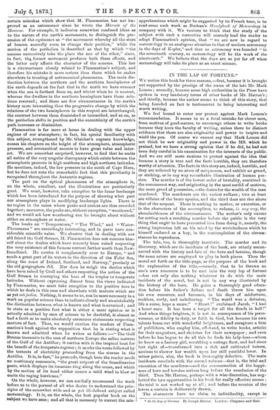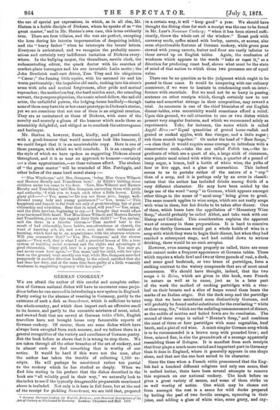IN THE LAP OF FORTUNE.*
WE notice this book for three reasons,—first, because it is brought out supported by the prestige of the name of the late Mr. Mark Lemon ; secondly, because some high authorities in the Press have spoken in very laudatory terms of other books of Mr. Hatton's ; and thirdly, because the author seems to think of this story, that being founded on fact is tantamount to being interesting and worth writing.
We feel bound to enter our protest against Mark Lemon's recommendation. It seems to us a fatal mistake for clever men, from motives of good-nature, to encourage others to write books because they have the faculty of writing, unless there be distinct evidence that there are also originality and power to inspire and wield the pen. Of course we cannot say that Mark Lemon did not think he saw originality and power in the MS. which he praised, but we have a strong opinion that if he did, he had not been duly careful in his examination for the interests of the public. And we are still more anxious to protest against the idea that because a story is true and the facts horrible, they are therefore worthy of attention. The facts in this story are, indeed, horrible, and they are relieved by no atom of uuiqueness, and exhibit no grand, or striking, or in any way remarkable illustration of human pas- sion. The murder is of the lowest order of brutality, contrived in the commonest way, and originating in the most sordid of motives, the mere greed of possession,—the desire for the wealth of the man murdered. The murderers are the veriest ruffians; two at least are villains of the brute species, and the third does not rise above that of the serpent. There is nothing in motive, or execution, or in the characters of the accomplices, to redeem, in any way, the abominableness of the circumstances. The author's only excuse for setting such a revolting murder before the public is the very thing that ought to have prevented him from doing it, namely, the strong impression left on his mind by the wretchedness which he himself endured as a boy, in the contemplation of the circum- stances be reproduces.
The tale, too, is thoroughly inartistic. The murder and its discovery, which are the incidents of the book, are utterly uncon- nected with the history and fate of the hero and heroine, though the same actors are employed to play in both pieces. Then the moral set forth on the title-page, as the purpose of the book and the explanation of the title,—nainely, that to be thrown on one's own resources is to be cast into the very lap of fortune —has not only also nothing whatever to do with the main incidents of the novel, but is not in any way illustrated by the history of the hero. He gains a thoroughly good educa- tion before his father's failure and death throw him upon his own resources, and becomes, in his days of misfortune, reckless, surly, and unbelieving. "The world was a delusion, life a curse, hope a snare." " Heart !" exclaimed Jacob, "I had a heart once. It has been a target for all the fiends in hell !" And when things brighten, it is not in consequence of his perse- verance, or fidelity to duty, or faith in God, but because his own talents beam out with wonderful brightness, and enrapture a firm of publishers, who employ him, off-hand, to write books, articles for their magazines, and sketches for their newspaper ; and even before he has begun to do all this he finds his lady-love—whom he knew as a factory girl, scrubbing a cottage floor, and had since lost sight of—transformed into a rich and cultivated heiress, anxious to shower her wealth upon her still youthful lover. In minor points, also, the book is thoroughly defective. The main- incidents conclude with the second volume—that is, the trial and execution of the murderer—and the consummation of the happi- ness of hero and heroine arrives long before the conclusion of the third. Then Mr. Hatton, perhaps with a wise discretion, has neg- lected the two opportunities in his book for really effective scenes ; the trial is not worked up at all ; and before the reunion of the lovers a curtain is deliberately drawn.
The characters have no claim to individuality, except in
* the Lap of Fortune. By Joseph Hatton. London: Chapman and Eau.
the use of special pet expressions, in which, as in all else, Mr. Hatton is a feeble disciple of Dickens, whom he speaks of as "the great master," and in Mr. Hatton's own case, this is too evidently true. There are four villains, and the rest are perfect, excepting the hero during his interim impersonation of despairing infidel, and the "heavy father" when he intercepts the lovers' letters.
Everyone is caricatured, and we recognise the probably uncon- -scions and certainly very indifferent imitation of Dickens every- where. In the bullying mayor, the threadbare, servile clerk, the rodomontading editor, the quack doctor with his snatches of market-place harangues and his one invariable Latin motto ; the
John Brodieish mail-cart driver, Tom Tits), and his ubiquitous " Cmsar ;" the fuming little squire, with his assumed ire and his -warm partisanship ; the impulsive old uncle, rushing into his niece's
arms with sobs and mutual forgiveness, after pride and mutual reproaches ; the motherless boy, the hard maiden aunt, the consoling 'servant, the pompous physician, the comic school-fellow, the sad old actor, the unfaithful patron, the lodging-house landlady—though none of them may have his or her exact prototype in Dickens's stories, yet we are conscious that not one of them is an original creation.
They are as caricatured as those of Dickens, with none of the novelty and scarcely a gleam of the humour which made those so irresistibly delightful, and obliged us to overlook the extravagance and burlesque.
Mr. Hatton is, however, fluent, kindly, and good-humoured, -with a good-humour that would sometimes look like humour, if -we could forget that it is an unmistakable copy. Here is one of these passages, with which we will conclude. It is an example of
'the style of which we have spoken as suggesting Dickens almost throughout, and it is as near an approach to humour—certainly
not a close approximation,—as these volumes afford. The student of"the great master" will be reminded of Mrs. Pardiggle, and other ladies of the same hard moral stamp :— ", Miss Winthorpe,' said Mrs. Gompson, 'bring Miss Grace Wilmott and Masters Barnby and Trundleton here.'- At Edith's bidding three children under ten came to the door. 'Now, Miss Wilmott and Masters Barnby and Trundleton,' said Mrs. Gompson, surveying them with pride and authority, I wish you to teach each other a little lesson. Little gipsy Yes, mum.'—' Do you see those nice, happy, well-
dressed young lady and young gentlemen ? Yes, mum.'—' This
-happiness and luxury is the fruit not only of good-breeding, but of good -citizenship and education. Bear that in mind, will you? '= Yes, mum,' said the little hawker, beginning to cry.—' I thought that would affect your hardened little heart. Now Miss Grace Wilmott and Masters Barnby and Trundleton, you see this ragged dirty little child ? Yes, ma'am,' said the three in a falsetto chorus.—' That matted hair is the result of bad citizenship, loose habits, non-attendance at church, the want of knowing a-b, ab, and c-o-w, cow, and other rudiments of learning, which lead up to an acquaintance with the abstruse sciences.
Will you remember that ? Yes, Mrs. Gompson,' said the chorus again.—' Very well, that is what I call a practical lesson of life, a true system of teaching social economy and the rights and advantages of good citizenship. Gipsy girl, here is a penny for you. You may go, and never come here again.'—' Yes, mum,' and the child, with her eyes bent on the ground, went meekly one way, while Mrs. Gompson marched pompously in another direction leading to the school, satisfied that she had done her duty, and at the same time been guilty of a little womanly -weakness in supporting vagrancy with her purse."



































 Previous page
Previous page